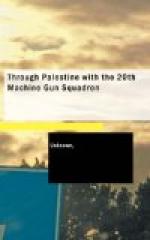It was at this time that Major Davies, our O.C. (who had not been well since leaving the Jordan Valley, and for some time past had only been able to keep out of hospital by dint of great strength of mind and powers of endurance, in spite of the advice of his own, and medical, officers), was at last sent to the hospital in Aleppo, which had been established by the 14th C.F.A. He had only been there a few days, however, when, to the grief of all, he passed away in the clutches of that dread disease, malignant malaria.
He was buried in the Aleppo Protestant Cemetery on November 11th 1918, in the presence of the Divisional Commander, the Brigade Commander, the C.O.’s of all the units in the Brigades, and many members of his Squadron, all of whom felt how regrettable it was that he had not been spared to hear THE GREAT NEWS which we all then felt was so close at hand, and towards the obtaining of which he had, ever since the outbreak of the War, contributed so much energy and ability. The “H.A.C.” kindly provided us with a gun-carriage upon which to convey him to his resting place, and Capt. Powell, C.F., the Brigade Chaplain, officiated.
NEARING THE END.
As those who had been present at the ceremony were waiting for the motor lorries to take them back to Muslimie the momentous news was received that an armistice had been signed with Germany!
It was universally felt to be a sad coincidence that he who had come through the war from start to finish should thus have been laid low at the very end of his labours. That Major St. John Davies, M.C., was undoubtedly a great leader and very considerate of his men’s welfare, was universally known. There can be no doubt that he would have had a successful career, had he been spared, in any profession he might have chosen.
Malaria was taking its toll, and a few days later Signaller Boak, who had been the Squadron’s Brigade Orderly throughout the last operations, fell another victim to its clutches. He was buried in the Military Cemetery, Aleppo, a number of his comrades being present at the graveside.
AFTER THE ARMISTICE.
Capt. R.H. Fairbairns, M.C., now took command, with Lieut. A.O.W. Kindell as Second-in-Command. The strength of the Squadron was now four officers, 145 O.R.’s, 116 riding horses, 77 draught mules, 36 pack animals, and, as no reinforcements had reached the Squadron since the start of operations on September 19th, these figures represented a loss of two officers, 67 O.R.’s, 65 riding horses, three draught mules and seven pack animals. Considering that the Squadron had covered 450 miles in 43 days, in addition to the fighting, the loss in animals (especially draught) was extremely small, and results show that the Squadron has every reason to be proud of its horsemastership.
The Sections were now withdrawn from “outpost” and the Squadron moved into Muslimie station, where a certain number of buildings appeared to be available, and capable of affording protection from the wet weather, which showed signs of coming on.




